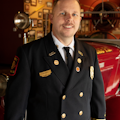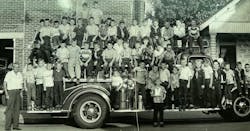Growing Volunteer Fire Departments: Stakeholders’ Role in Changing Community Culture
Although there are pockets of strong volunteer departments in growing communities across the country, it’s safe to say that the majority struggle, to say the least. If they can fill their roster—and I do mean if—response still usually is very poor at certain times of the day and/or on certain days of the week. It has become almost impossible to retain long-term members, whether they are dismissed for not meeting requirements or they leave on their own because of burnout.
Why is this?
In the 1990s and prior, it was very easy to become a volunteer firefighter. Most states required very little training before new members rolled out on their first call.
Most volunteer departments responded only to fires, alarms and, possibly, some automobile extrications.
Continuing education outside of regular department meetings was all but nonexistent and definitely wasn’t any type of requirement.
Run volumes were significantly lower than they are today, and they were so manageable that local business owners were more than happy to allow their employees who were volunteers to leave for emergencies.
In these times, “the culture” was created. These were the glory days of the volunteer fire service. These were the days when business owners and politicians were members of the local volunteer fire department. People asked, “What can I do for my community?” not “What can my community do for me?”
I remember it as if it were yesterday, being a new firefighter and hearing senior firefighters and fire officers brag about the talents and success of our volunteer department and how they would put it up against any paid department in the state.
This same pride and mentality passed to political officials and the citizens. I recall our mayor giving a speech and bragging on how our volunteer fire department was saving millions of tax dollars by being volunteer while at the same time holding the same ISO rating as some of our larger city neighbors that had fully paid staff. These types of comments truly made everyone in the community proud of our department and the volunteer members. You couldn’t help but hold your head high.
This is the same feeling of passion and service that volunteers felt across the country for decades.
Everything changed
What it takes to join the department went from hours of training to multiple grueling days per week for several months.
Run responses started to change from strictly fires/alarms and extrications to include medical, hazmat and several other types of specialty responses.
Because of the new responses and a busier world, run volumes started to increase dramatically. The large increase in run volume became a burden for businesses to allow employees who were members to leave work for emergencies.
Training requirements went from a monthly meeting to never-ending in-person and online commitments. All firefighters, whether paid or volunteer, must get 218 hours annually to maintain ISO standard requirements. We ask volunteers to do this on top of a full-time job, a family, hobbies and, oh yeah, children’s activities—the same activities that used to be in the local area and only lasted a couple of months that now are year-round and travel all over the state and sometimes farther.
The pace of human lives in the glory days of the volunteer fire service aren’t even remotely comparable with that of today, but yet, as a volunteer fire service/community government, we still expect them to be. We still expect 20 or more volunteer firefighters to spring into action when the alarm sounds to save the day.
Passion
This modern-day mentality had me really stumped, so I started to ask individuals in our community a question: “What do you believe makes a volunteer firefighter volunteer?” The response that I received more often than not is “passion.”
I agree that this probably is the best single-word answer. However, it makes me question other things, such as what about police officers, EMS staff and other types of government/municipal workers? Does being paid mean that they aren’t passionate? If they are passionate, why aren’t smaller cities and towns saving billions of dollars nationwide by asking all of these individuals to volunteer and do these jobs for free? This sounds kind of crazy, right? However, have you considered that the only reason that it sounds crazy is because of a couple of centuries of created culture of people doing a totally different job in a totally different world, a culture of when times were slower, requirements were less, and passion and community pride were at an all-time high?
In the modern day, I am sure that we all can think of some past cultures that are just mind-blowing, such as having to actually memorize phone numbers of family and friends, and having to drive to a video store to rent a movie, and smoking a cigarette in a restaurant in as recently as 2012. Our department has a photo from the 1950s in which a firefighter is smoking a cigarette while children visit the station for fire prevention. Can you imagine someone doing that today?
When we lived these types of things, they seemed normal, but once the mindset was changed, it’s difficult to believe that it even happened.
People don’t like change. We are creatures of habit, and this is particularly true for innovation in a small community. When the old ways feel safe and comfortable, people might hesitate to adopt any change.
Building a culture of innovation means that we must change how people think and get rid of the “this is the way that we always have done it” mentality.
The public must be told
Once again, I know that this article doesn’t fit all volunteer/combination departments, but I am sure that many can very much relate. I started my journey as a volunteer and still serve with several dedicated volunteers today, but such individuals are few and far between. I feel as though, sometimes as communities, it’s as if we are driving down the road in our car staring in the rearview mirror, and because we don’t look forward at things that are coming, we are certain to crash.
If you read to this point, you might expect me to have an answer to this rapidly growing issue: How do we fix a volunteer fire service that’s failing? I believe that, outside of funding, it’s by educating our communities, our political officials and the public. Make sure that they know and understand the struggles that departments face with volunteer response, recruitment and retention. This isn’t a topic of paid vs. volunteer. This is about providing the best service for the citizens and the community that we serve by educating all of the invested parties regarding what’s changed and how they can be part of changing the culture to better their community.
About the Author

James Richey
James Richey is chief of the city of Scottsburg, IN, Fire Department. He is a 26-year veteran of the fire service. Richey started his journey as a volunteer firefighter with the Scottsburg Volunteer Fire Department in 1999. After rising through the ranks, he received a career position as chief of the department in 2008. Since 2017, Richey has served on the board of directors of the Indiana Fire Chiefs Association, where he currently holds the position of Second Vice President. He also is a member of the Supporting Heroes response team, which responds to fire, EMS and police LODDs in Indiana, Kentucky and Missouri.
